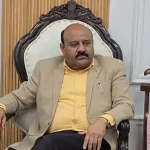Jammu, July 29: Apni Party on Saturday held a peaceful protest here demanding the reservation of two Legislative Assembly seats for the Sikh community in Jammu & Kashmir.
The protest was organized by Provincial President, Jammu, Women Wing, Pavneet Kaur along with District President Jammu Rural-B Adv Harpreet Singh, Provincial President, Youth Wing Jammu, Vipul Bali, Provincial President Transport Union, Tirath Singh, the party said in a statement issued here. The protesters shouted slogans in favour of their demands.
The party leader Pavneet Kour said, “The community has remained neglected regarding their political representation in government and Legislative Assembly while priority was given to other communities.”
She said that the Sikhs form a large chunk of the population and have contributed to society in J&K as well as at the national level – in defence, police, administration, social works, and education system but the community was not given preference by the successive governments.
“The community has a history of contribution and defending the borders of the country, but when it comes to their political representation or reservation of seats for them in both the regions, they face discrimination that needs to be addressed before it is too late,” she said.
Meanwhile, District President Rural-B Harpreet Singh also expressed concern over the discriminatory approach towards the Sikh community and demanded the reorganization of the Punjabi language as one of the official languages in Jammu and Kashmir.
“Punjabi language is being spoken across Jammu plains, and parts of Kashmir valley with no barrier of caste or community or region. It has rich cultural value and written historical records with reference to J&K during Maharaja times that need to be considered by recognizing the language as one of the official languages in J&K,” he said.
The Punjabi-speaking people’s work and their heritage must be recognized by the government, he said, adding, “We are not against anyone being given anything, but Sikhs should be given political reservation. Thus, two Legislative Assembly seats must be reserved for them.”








